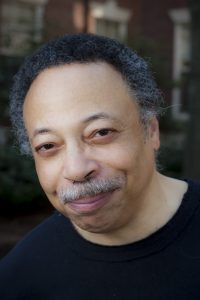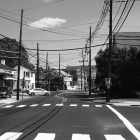A Parliament of Poems: An Interview with Parliamentary Poet Laureate, George Elliott Clarke

Photo courtesy of Harvard University
Given that Toronto poet, editor, critic, novelist and librettist George Elliott Clarke is Canada’s seventh official Parliamentary Poet Laureate (2016-17), I thought it would be interesting to explore some of his experiences now that he’s a bit more than halfway through his two-year term. From 2012 to 2015, he was also the fourth official Poet Laureate of Toronto.
Originally born in Windsor, Nova Scotia, near the Black Loyalist community of Three Mile Plains, George Elliott Clarke invented the term “Africadian” and pioneered the study of African-Canadian literature. He wrote the libretto for James Rolfe’s acclaimed opera, Beatrice Chancy (1998), and saw his play, Whylah Falls: The Play, translated into Italian and produced in Venice, Italy (2002). He is a noted artist in song, drama, fiction, screenplay, essays, and poetry. Now teaching African-Canadian literature at the University of Toronto, Clarke has taught at Duke, McGill, the University of British Columbia, and Harvard. He holds eight honorary doctorates, plus appointments to the Order of Nova Scotia and the Order of Canada. His recognitions include the Pierre Elliott Trudeau Fellows Prize, the Governor-General’s Award for Poetry, the National Magazine Gold Award for Poetry, the Premiul Poesis (Romania), the Dartmouth Book Award for Fiction, the Eric Hoffer Book Award for Poetry (US), and the Dr. Martin Luther King Jr. Achievement Award. Clarke’s work is the subject of Africadian Atlantic: Essays on George Elliott Clarke (2012), edited by Joseph Pivato.
I originally met Clarke circa 1995 when he lived off Elgin Street in Ottawa’s Golden Triangle, a few years after he worked as a parliamentary assistant to Howard McCurdy, a Windsor (Ontario) Member of Parliament.
Rob Mclennan: You are the seventh Parliamentary Poet Laureate, roughly halfway through your two-year term. What were some of your hopes and expectations upon the position? How do you feel your first year has been?
George Ellliott Clarke: I had hoped, upon assuming the post, that I could ask the civil service to produce a couple of ideas—a national poetry map and the setting up of a poets’ corner in Parliament—and that it would be done expeditiously within the budget allotted. I wasn’t prepared for the frustration of delay and continuous need to explicate what I thought were pretty straightforward projects. I had also hoped that I’d be approached by parliamentarians to produce poems on official and/or ceremonial occasions. I was also frustrated by the non-inclination of parliamentarians to make use of my, i.e., my post—which makes me an Officer of Parliament. However, in the last couple of months, or, really, since September, I’ve had a lot more progress on the major projects—and parliamentarians have begun to request poems and to even recite them in the House of Commons and the Senate. Wow! THAT’s what a Parliamentary Poet Laureate should be doing! Also, I’ve begun to post to my website poems that I write in response to news stories, such as Leonard Cohen’s passing. I plan to do a lot more of that going forward. Oh, and I should clarify that, just because Parliamentarians were not requesting poems from me until October, it does not mean that I was sitting around, twiddling my thumbs. Au contraire! I wrote poems for The Globe & Mail, community groups, and I travelled across the country and internationally (US, Italy, Slovenia, Scotland, Mexico), representing Canada, poetry/poets, and Canadian poetry, giving readings. I even managed to publish two collections of poetry, a second novel, and an essay in book form, ALL appearing this past year. My schedule—I joke—is “presidential.” But I’m damn serious in that jest!
To sum up, the first year was a learning curve (ball). But I’m ready to run the gauntlet of my second year, all the way through to December 31st, 2017. Mixed metaphors and all.
RM: You were also, previously, Poet Laureate of Toronto. How did you approach that position, and, apart from the obvious scale, what differences do you see between the two positions?
GEC: Being Poet Laureate of Toronto was, in contrast, much easier than being “Poet Laureate of Canada,” which is the de facto status of being Parliamentary Poet Laureate. The reason is simple: at the city level, I had a staff member who was dedicated to helping me realize my vision, so to speak. Even if he and I—or myself and his superiors—disagreed on priorities or procedures, there was always a conversation that ended, ninety percent of the time, with an actual achievement being logged/recorded, much to everyone’s pleasure. At the federal level, there are invisible obstacles and fewer audible supports. I think that has much to do with 1) relative inconsequentiality of budget and 2) lack of civil-service accoutrements (office, staff, perqs), not to mention a dedicated Minister of the Crown to represent the Parliamentary Poet Laureate (not moi personally, but the office). The result, for me, is, the City was more responsive and faster to respond—even with a big “NO!”—than has been true for the upper level. On the other hand, I have, in recent months, felt that I was beginning to accomplish more.
RM: What do you feel you have been able to accomplish?
GEC: A damnable (if not self-damning) question! As I explained previously, the City of Toronto was nimbler and more expansive and engaged with me—or the Poet Laureate post—than has been possible (or visible) at the federal level. So, my civic achievements were evident and realized efficiently: Poets’ Corner at City Hall, a medallion for office holders, annual address to City Council, poems requested and written for “official” occasions. I was even able—despite initial, municipal hesitation—to be part of the staff at Remembrance Day ceremonies (2014, 2015). Of course, I also attended many functions to read poetry, and I founded the East End Poetry Festival, and organized a “Beat Café” at City Hall for two summers in succession, until the Pan-Am Games killed that forum in 2015. My term as Poet Laureate of Canada is half over as of December 31st, 2016, so I can already look back over fifty percent of my term and realize—with dismay—that I have been extremely busy with giving and organizing readings, judging poetry competitions (everything from CBC/En Route to The Malahat Long Poem competition), issuing blurbs, travelling (I’ve just returned from an eight-day—in December, six-city lecture and reading tour in Germany and Austria)—nationally and internationally, and—at long last—penning poetry for parliamentarians to recite at events or in The Senate and in The House of Commons. I believe I’m the first Parliamentary Poet Laureate—the first of seven—to actually get poems recited bicamerally and recorded in Hansard. (I’ll note that I’ve also had poetry recited in the Legislative Assembly of Nova Scotia: am I the only English-Canadian poet to have his poetry recited in three legislative chambers? I smile at the thought.) So, I’d name that as a major accomplishment. Behind the scenes, I’ve been championing a Poets’ Corner for the Library of Parliament, and I’ve been told that it’s taking shape. I’ve also championed a “Poetry Map” of the nation that was supposed to work by allowing visitors to the site to click on a specific constituency and have poets, poems, and relevant snippets of verse to that ‘riding’ pop up. However, that has since morphed into a “Poetry Registry,” which will be more of a standard check-list (online), far less chic than a Map, but it is what is bureaucratically (and budgetarily) achievable. I also organized a Shakespeare reading on Parliament Hill, a National Aboriginal Day poetry reading, a Love Poetry Festival (in honor of Gwen [MacEwen] and Milton [Acorn]), and also chose a medallion—in nickel—for Poets Laureate past/present/future. I’ve been so busy that I’ve had to hire a secretary—at my personal expense—since June 2016, given that I’m still a full-time, full Professor at the University of Toronto AND a full-time poet/writer, who’s published—in 2016—an acclaimed novel, an essay (in book form), a collection of poetry, and the first half of the first volume of my tripartite epic, Canticles. A typical week pour moi? November 30th: Poetry reading at Trent U (Peterborough); December 1st: Poetry performance with singer Shelley Hamilton and Ron Davis’s Symphronica at Lula Lounge (Toronto); December 4th: Launch of Canticles I (MMXVI) at The Supermarket (Toronto); December 5th: Poetry reading at University College (Toronto) and a PhD Dissertation Defence Committee meeting; December 6th: Teach two classes at the U of Toronto; December 7th: Fly to Frankfurt, Germany, arrive December 8th, and give a lecture and a poetry reading at Goethe University that same day … I assure you that is a typical week for me. I am joking when I say, pace James Brown, “I’m the hardest-working poet in Canada,” but I doubt I have many rivals in this regard. Oh—almost forgot—I plan to rewrite the Constitution of Canada (1867-2017) in the next month. I believe that Gaspereau Press will publish it, along with my rewrite of Shakespeare’s The Merchant of Venice, in Spring 2017 … AND I’m still publishing individual poems—taking up dozens of pages—in journals, international and domestic; online and in print; in newspapers as well as in academic journals. I even drove my car to a BMW motorcycle rally in Paris, Ontario, in June, to read from my novel, The Motorcyclist, to actual riders/bikers. Then, I flew to Paris, France, to edit my epic poem, Canticles. Whew! 2017 is already half-booked—right up to June. I think the question about “accomplishment” is still being answered. I admit that I’m defensive about this because my complaint about not being asked by parliametarians to write poetry got misinterpreted by some as a suggestion that I wasn’t “doing anything.” No, in reality, I was already super-busy, but was now—responsibly—asking parliamentarians to help me fulfill the written (legislated) duties of the post.
RM: Obviously, the American and British equivalents to the Canadian Parliamentary Poet Laureate have been in existence far longer—Canada’s first, George Bowering, was appointed in 2002, while the first American laureate, Robert Penn Warren, was appointed in 1986 (the “laureateship” actually replacing an earlier position, “Consultants in Poetry,” established in 1937 with the appointment of Joseph Auslander), and the first British laureate, John Dryden, was appointed by Charles II in 1668. What do you see as the reason for the disconnect between Parliament itself and the position of Poet Laureate? Is the position still new enough that the House doesn’t really understand what they’re supposed to do with you?
GEC: Rob, I think I can afford to be brief here given the grotesque length of my previous answer. I really do think that when the Hon. Jerry Grafstein (Senator) and poet Roger Nash proposed the creation of this position, they likely properly thought that it was all self-explanatory. Unfortunately, the popular/public understanding of the role of poets had shifted badly from, well, 1900-2000, from the Shelley notion that we are “unacknowledged legislators” to the high modernist propaganda that we are insular oracles publishing cryptic creations that are of interest mainly (if not only) to professors of literature and graduate students. I’ll speculate that a Hansard search of quotations of poets/poetry in the Parliament will show a steady decline in occurrence from the beginning of the last century down to the present, with a significant tapering off after the 1960s, when politics became more the domain of technocrats, lawyers, and economists, and less open—perhaps—to learned graduates of the humanities. The Library of Parliament has a two to three volume set of Hansard quotations from Shakespeare, 1867-1960: as I say, it is a very hefty series of volumes and only focused on Shakespeare citations. Its existence proves that, at least up to the ’60s, many—if not the majority of (I presume) anglophone MPs had more than a nodding acquaintance with Shakespeare and were willing to lard their Commons speeches with references to the Bard and, most likely, scripture. Arguably, the level of poetic literacy is less than it once was, which would explain the disconnect between the creation of the post of Parliamentary Poet Laureate and the readiness of parliamentarians to actually request poetry from the incumbent. Again, I’m glad—proud—that this has finally happened, on my watch (so to speak), and I hope that this engagement continues and flowers. I’m reminded here that the last PM to quote poetry frequently (though perhaps not in the House) was the Rt. Hon. Pierre Elliott Trudeau (1968-79, 1980-84), whose predilection for verse was perhaps cemented by its role in saving him from knife-wielding bandits in Iraq in 1948 (see his Memoirs) … Oh yes, I should add that so-called spoken word or performance poets have taken up the mantle of “unacknowledged legislators” and made it freshly relevant—as did the beats and the 60s’ protest (and rock’n’roll bardic) poets, though few of them are cited (thus far) in actual legislatures.
(P.S. I forgot to mention my circulation of a poem, to all parliamentarians, in December 2016, “Aesop of Three Mile Plains,” printed/published anonymously by “A Friend of the Canadian People.” I hope that this “Friend” and I will circulate at least one more poem before my term ends—in 367 days.)
RM: Part of your role has been to provide advice to “the Parliamentary Librarian regarding the Library’s collection and acquisitions to enrich its cultural materials.” What has the process been like, and what books or other items has the library acquired based on your recommendations?
GEC: Upon assumption of my position, I was informed that it was not necessary to advise the Library of Parliament re: poetry acquisitions. However, at least one book has been purchased due to my inquiries, and I do have it in the back of my mind to suggest others. I presume that the reason why my advice might not be necessary is that two copies of every work published in Canada are supposed to go to the National Library (Bibliotheque nationale) automatically, which is the actual acquisition site, not the Library of Parliament, which is—more or less—the principal borrowing (ordering) site for members of Parliament and senators. However, I do know that it is not always the case that copies are sent—as they’re supposed to be sent by law—to the National Library. So, in order to acquire a copy of Gord Downie’s Coke Machine Glow (2001), I had to buy it—at my personal expense—from an oline bookseller. On the other hand, my inquiry about the works of Serge H. Moise, a Haitian-Quebecois poet, did result—apparently—in the acquisition of one of his books, which, published in France, was exempt from the requirement that it be deposited with the National Library. I hope my answer isn’t too convoluted. In short, it shouldn’t be necessary for me to advise the Library of Parliament on acquiring Canadian poetry books because they’re supposed to be sent—automatically—to the National Library … However, yes, there are gaps in the collection, but such can only be ascertained through research.
RM: Finally, what would your advice be, once your term ends, to the next Parliamentary Poet Laureate?
GEC: Keeping in mind that number eight will be francophone, with, presumably, an orientation toward the different context of French-language readers, poets, publishing, and reviewing, I’d still advise him or her to make his or her presence known to parliamentarians, via the Speakers of the House and the Senate, to invite requests for poems. I’d also advise him or her to make automatic use of the Parliamentary Poet website to post poems in response to various subjects. I also think that he or she should maintain the Parliamentary Poem of the Month—as a means of giving voice, especially, to poets who may otherwise not enjoy such national and bilingual exposure. I’d also advise him or her to add his or her name/photo/poem to the Poets’ Corner that I’m establishing—to make it a tradition. I’d also advise him or her to try to be a presence at national, ceremonial occasions. Of course, I’d give the same advice to the next anglophone Poets Laureate—until everyone comes to see the position as integral (not “irrelevant”) to the proper functioning of a democracy that cares about the expression of ideas in the most compellingly artisanal language possible.



